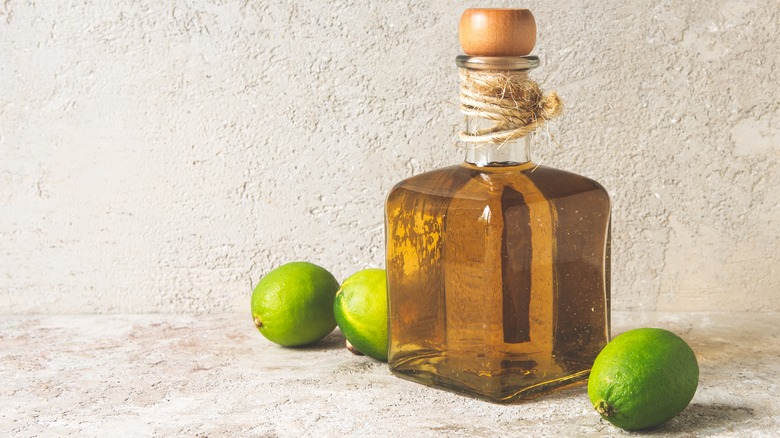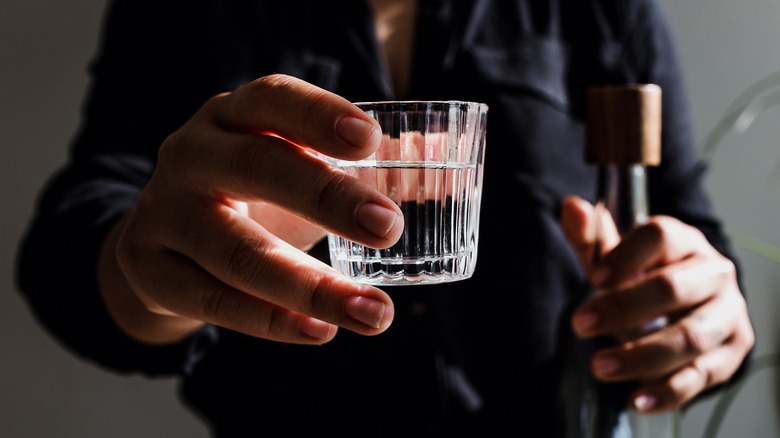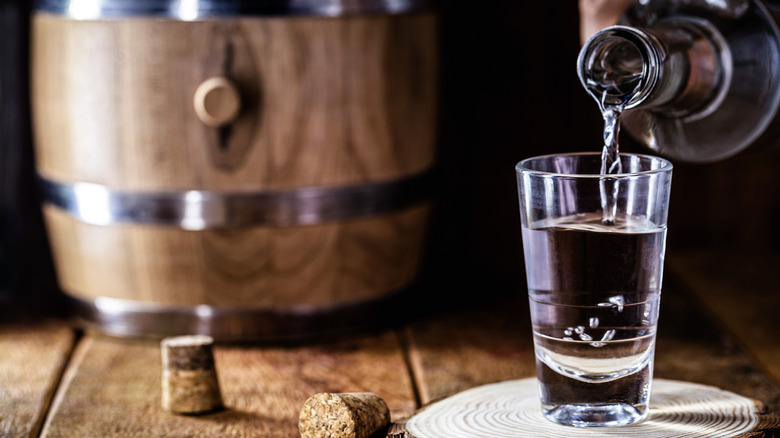How Long You Have To Drink An Open Tequila Bottle For The Best Flavor
Sometimes, it's easy to empty out a whole bottle of tequila, perhaps in a big celebration with good friends that requires plenty of spicy margaritas or citrusy palomas. Other times, you wind up with leftovers — or maybe you've bought a pricey label that's meant to be savored slowly, sipped in solitude or in quieter social settings. In either case, you may wonder: How much time do you have to drink a bottle of tequila before it goes bad?
To enjoy a quality tequila at its peak from start to finish, you'll want to finish the bottle within a year of opening it. This is plenty of time, in most circumstances, but if you saved up to invest in an expensive label, or if a particular bottle is associated with a fond memory, you may feel inclined to hold onto it for longer. However, just like wine, beer, and other liquors, tequila won't stay perfect forever.
This high-alcohol spirit does not have a hard expiration date — it won't spoil and become unsafe to drink, like milk or juice do — but once you open the bottle, its flavors, aromas, and appearance will begin to degrade. Learning what makes tequila go "off" over time can help you understand why it's best to drink up leftovers ASAP, or at least within 12 months.
How environmental factors harm tequila over time
Tequila can change over time based on exposure to three environmental elements: air, light, and temperature. While it is possible to control these factors to some extent, based on where you store your spirits, the first factor — exposure to air — occurs as soon as you open the bottle, initiating a deterioration process known as oxidation.
When tequila comes into contact with oxygen in the air around us, a chemical reaction occurs. The ethanol alcohol in the spirit forms a liquid called acetaldehyde, which eventually transforms into acetic acid, the same acid that gives vinegar its taste and smell. The effect is not immediate or dramatic, but takes place over time, ultimately altering the tequila's key characteristics past a point of no return. After about a year, or even as little as two months, you may notice that the spirit's taste has lost some complexity, the smell has faded, or the color has changed.
While variations in color depend on the type of tequila, and whether any artificial colors have been added in the first place, the once-transparent liquid may turn cloudy. And thanks to the acetic acid, your smooth and refreshing tequila could take on a sour taste. Fluctuations in temperature or exposure to sunlight can accelerate the oxidation process, and similarly impact the quality of your tequila. Ultraviolet rays and extreme textures can even cause changes to the chemical composition of the tequila's mouthfeel, making for a less smooth sipping experience.
Tips for storing tequila the right way
It may seem counterintuitive that an opened tequila bottle is best consumed within a year, since some of the highest-valued versions of these spirits — such as reposado or añejo — are aged for several years. In fact, during aging, these types of tequila experience a slow, controlled oxidation process. However, this does not make aged tequila protected against nor more susceptible to oxidation later on. The spirit is bottled at its peak, and will start to decline after being opened, regardless of its initial age.
It's up to you to care for your tequila by storing the bottle upright in a cool, dark, dry space. While a nice bottle of tequila may look impressive on your bar cart, it's best kept in a cabinet for better flavor and longevity. Unless you plan on finishing the bottle and want a slight chill on it, keep it out of the fridge, which can also degrade its quality over time.
Storing your tequila in a cabinet will limit exposure to harmful environmental factors, but to minimize oxidation, it's also crucial to quickly and securely close the bottle after each use. Don't pour out a shot and leave the bottle open because you might want more in a moment — each second allows more oxygen to infiltrate the bottle. Again, it's unlikely for tequila to become unsafe to drink and cause foodborne illness, but a bottle past its prime is better suited for mixing into a cocktail than serving neat.



